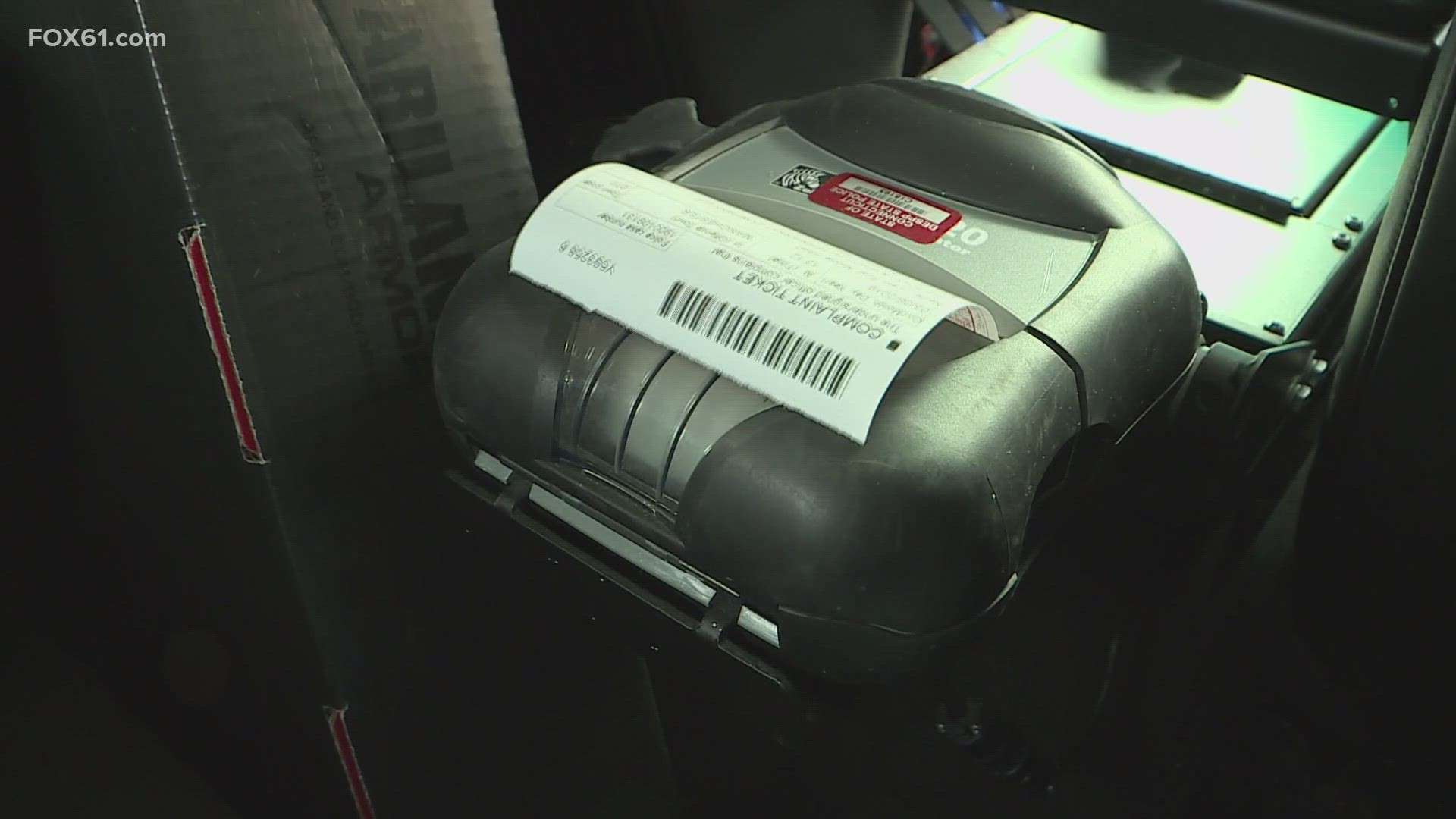'Significant failures' | Report released by independent investigation into state police traffic records
The investigation found that inaction by state police leadership in 2018, along with poor training and understanding by troopers, led to data discrepancies.

An independent investigation into Connecticut State Police's falsified traffic ticket scandal concluded that while there were some "significant failures" by CSP, they were more the result of poor training and lack of action rather than intentional falsification.
The report was released by Gov. Ned Lamont's office on Thursday. The governor called for the investigation after data analysts with the University of Connecticut stated that a recent audit by the Connecticut Racial Profiling Prohibition Project (CTRP3) found that state police troopers overreported and underreported racial profiling records between 2014 and 2021.
The misreporting resulted in too many drivers being identified as white, analysts said at the time. But, they also said that they did not try to determine whether or not the records were intentionally falsified or were wrong due to carelessness.
The CTRP3 audit stated that the number of traffic infractions reported to their advisory board did not match those reported to the state court system.
On July 24, 2023, Lamont's office asked former U.S. Attorney Deirdre M. Daly and her firm, Finn Dixon and Herlin LLP, to review the misconduct and conduct the investigation.
In short, the investigation found "significant failures" by CSP when it came to reporting racial profiling data and that remedial measures were required to ensure accuracy going forward.
"I will not tolerate it. It’s as simple as that. I will not tolerate it," said Interim Comm. Ronnell Higgins of Emergency Services and Public Protection.
Background
Connecticut has an anti-racial profiling statute called the Alvin Penn Law. It prohibits traffic stops motivated solely by someone's race, color, ethnicity, age, gender, or sexual orientation.
CTRP3 was established to advise the state's Office of Policy and Management (OPM) to analyze traffic stop data and provide those reports to the governor and General Assembly.
Since October 2013, all law enforcement agencies in the state, including CSP, have been required to submit that data.
The racial profiling data submitted by CSP includes the perceived race, ethnicity, age, and gender of people stopped by troopers and constables (constables are peace officers appointed by the towns within which they work and are supervised by CSP resident troopers. All constables in this investigation are retired CSP troopers).
Troopers and constables also report whether they resulted in an infraction, written or verbal warning, or misdemeanor.
Troopers and constables then submit the racial profiling data through CSP's internal Nexgen Record Management System, which then goes to CTRP3.
In the fall of 2022, it came to CTRP3's attention that four troopers (three of whom had retired by this time) had been subjected to internal affairs investigations for falsifying their traffic stop data in 2018.
The previously undisclosed conduct then caused CTRP3 to grow concerned over the accuracy and reliability of the racial profiling data that's been submitted. That, in turn, led to CTRP3 beginning an audit of CSP's data for the years between 2014 and 2021.
On June 28, 2023, CTRP3 released the audit's results. The audit focused on whether the racial profiling data, particularly the designated manner of the traffic stops recorded, matched the data maintained independently by the Connecticut Centralized Infraction Bureau (CIB).
According to the audit, "significant discrepancies" were found between the two.
The audit stated that nearly 26,000 traffic stops reported through the racial profiling data as an infraction had no corresponding record at CIB (these are the "over-reported records," according to the investigation).
CTRP3 concluded that the audit revealed a "historical pattern and practice among some troopers and constables of submitting infraction records that were likely false or inaccurate to the racial profiling system."
According to the audit, 130 troopers and constables had more than eight over-reported records in a single year, representing more than 20% of that trooper's or constable's infraction records in the racial profiling data for that year.
These troopers and constables were labeled as "flagged" for the independent investigation.
The Investigation
The investigation began in late July 2023 to see if CSP troopers and constables falsified traffic stop records during 2014-2021, why the falsification happened, and how it went undetected and unreported during all this time.
The governor's office also asked investigators to provide recommendations regarding any measures that should be implemented to avoid any future issues.
Investigators collected over 50,000 emails belonging to CSP and officials with the Department of Emergency Services and Public Protection (DESPP). They also collected and reviewed other documents, including internal affairs reports, CSP policies and procedures, data from Nexgen, and other data files. Data from CSP and CIB comparing the infractions reported CTRP3's audit report, along with 11 tips submitted through the investigation's confidential tip line and website.
Overall, the investigation interviewed 89 people, including 31 active and retired troopers working as constables and three retired troopers who likely "engaged in potential falsification" of traffic stop data.
They also interviewed 33 active or retired CSP leaders, three current or retired senior DESPP personnel, 13 current and former State prosecutors and inspectors, the CTRP3 project manager, a representative of CIB, three Nexgen employees, and one chief of police for a municipal police department.
RELATED: Connecticut judge rejects troopers' union request to bar release of names in fake ticket probe
Investigators said that CSP fully cooperated with the investigation along with CSP union representatives.
The investigation itself was limited due to the timeline, causing not all emails or data to be reviewed. However, officials said they don't believe anything not reviewed would have resulted in a different conclusion.
Limitations also came regarding finding retired flagged tropers and that CSP did not complete its reconciliation review of the over-reported records by the report's publishing.
Investigators said while the limitations impacted the ability to make findings when it came to certain retired troopers, they didn't believe ethel imitations had a meaningful impact on the investigation's conclusions.
'Significant failures'
According to the investigation, CSP leaders learned in the fall of 2018 that four troopers had falsified Nexgen records to, more or less, appear more active or "productive" to their supervisors.
The troopers were referred for an internal affairs investigation, and after the misconduct surfaced, CSP officials indicated an internal audit and analysis that showed there were possible broader inaccuracies in the data.
And, by extension, inaccuracies in the racial profiling data reported to CTRP3.
However, despite this knowledge, CSP leadership failed to respond effectively to the indications of these possible broader issues.
Specifically, the investigation said leaders failed to refer the troopers for criminal investigation by any State's Attorney's office, even though the troopers' more immediate supervisors knew that what happened implicated certain state criminate statutes. They also failed to impose discipline on the two troopers who did not retire before the internal affairs investigation was completed.
Leaders also failed to pursue the findings of an internal CSP audit that indicated the possible broader issues with accuracy and other potential misconduct by other troopers. They also failed to learn why there were significant discrepancies in the data.
The investigation said leaders did not implement appropriate training and remedial measures to ensure that troopers understood their reporting obligations and that accurate racial profiling data was reported to CTRP3. They also did not alert or collaborate with CTRP3 regarding the four troopers' falsified records or the possible broader issues with accuracy.
To read the full report, click here.
Investigators concluded that the failures demonstrated inadequate leadership, judgment, and initiative.
The CSP leaders involved in this episode retired in late 2018 or early 2019, however, the failures nonetheless demonstrated a need for current leadership to encourage a "cultural change" within CSP.
This change is to prioritize transparency and diligent self-evaluation.
The investigation also found that due to other organizational and leadership failures, troopers had a limited understanding of their racial profiling data reporting obligations or the purpose of the data, there was little to no training on how or when to enter the data, line supervisors had little oversight over the data entry practices on an ongoing basis and there was no internal audit function within CSP to assess accuracy.
Overall, both before and after the revelation of the 2018 misconduct, there was little attention paid by CSP to the importance of accurate and reliable racial profiling data reporting, and the inattention was shown in various deficient procedures and practices among troopers.
Conclusions
The investigation recommended that CSP refer six active troopers and one active constable to internal affairs for further investigation, and CSP has committed to those investigations.
Investigators said the referrals were based on the fact those troopers or constables failed to offer any plausible alternative explanation for their over-reported records and/or the records were so large in number or persistent that they were unlikely to be explained away by mistakes, technical failures, or one of the other "innocent explanations" that were identified by investigators.
The investigation did not conclude that the referred troopers and constables engaged in intentional misconduct, but only that further scrutiny by internal affairs was needed.
CSP leaders also independently determined that between 5 and 8 additional active troopers would be referred to internal affairs for a lower-level administrative inquiry.
Investigators said that while they assess that the troopers' misconduct wasn't intentional, CSP had concerns regarding the number, nature, and/or persistence of the over-reported records.
The investigation recommended some remedial measures that CSP and the state must take to address the failures they found.
They recommended enhanced supervision and auditing by CSP and conducting comprehensive racial profile data audits to ensure they remain reliable and accurate.
RELATED: Internal investigation reveals former Hartford officer admitted to fabricating traffic stops
They also recommended better communication and collaboration with CTRP3 on annual and rotating audit findings and coming up with training and policy documents to ensure there is agreement on the expectations of troopers.
Training for troopers and dispatchers and technology changes were also recommended, along with overall improvements to internal affairs. The investigation outlined that there needs to be a clearly defined policy and procedure to follow in whether to refer an internal affairs issue for possible criminal investigation or decertification.
Finally, the investigation said that the state should consider legislative actions, including the adoption of a criminal statute to address the falsification of traffic stop data and racial profiling data. Also, adopting a statute that requires CSP to refer serious misconduct by troopers to the State's Attorney and the Police Officer Standards and Training Council for potential decertification.
Investigators said that there should be consideration requiring the Department of Motor Vehicles to code racial profiling information into licenses to improve accuracy, lessen the data-entry burden on troopers, and allocate resources and funding needed by CSP to implement the recommendations directed to CSP effectively.
Overall, the investigation said that the legislative action would help restore trust in CSP that was otherwise lost as a result of these events.
"I have as much confidence in my state police troopers today than I’ve ever had. I think this shows if there were problems, they’re almost all unintentional," Lamont said.
"We are asking police officers to be data recorders. That is not their job. We give them no ongoing training in what data reporting actually means on the backend," said State Rep. Greg Howard
---
Jennifer Glatz is a digital content producer at FOX61 News. She can be reached at jglatz@fox61.com.
Have a story idea or something on your mind you want to share? We want to hear from you! Email us at newstips@fox61.com
HERE ARE MORE WAYS TO GET FOX61 NEWS
Download the FOX61 News APP
iTunes: Click here to download
Google Play: Click here to download
Stream Live on ROKU: Add the channel from the ROKU store or by searching FOX61.
Steam Live on FIRE TV: Search ‘FOX61’ and click ‘Get’ to download.


